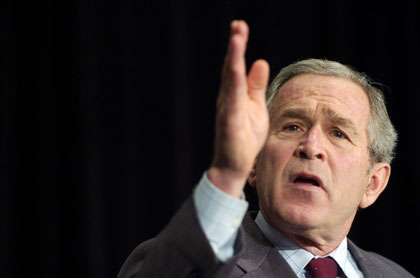Bush budget centers on military, Iraq
(Reuters)Updated: 2007-02-05 09:23
 U.S. President George W. Bush speaks at the House Democratic Issues Conference in Williamsburg, Virginia, February 3, 2007. [Reuters]  |
Democrats newly in control of Congress have pledged careful oversight of the hefty proposals for Iraq spending.
And as details of Bush's fiscal 2008 budget spill out into the media, Democrats took aim at expected proposals to wring savings from children's health care and other domestic programs.
Bush has pledged to balance the budget in five years and is adamant about his aim of extending his tax cuts that Democrats have called fiscally irresponsible.
But he acknowledged the looming budget debate at a conference on Saturday of House of Representatives Democrats.
"Some of it you'll like, some of it you won't like," he told Democrats.
Speaking on CNN on Sunday, White House budget director Rob Portman confirmed that Bush will ask Congress for $100 billion more for the Iraq and Afghanistan wars for fiscal year 2007, which ends in September.
He will seek $145 billion in war spending in 2008 and forecast $50 billion in expenditures for Iraq in 2009, Portman said.
The war spending for 2007 will mark the highest annual level since the invasion of Iraq nearly four years ago. The total for this year, $170 billion, includes the $100 billion request and $70 billion that Congress already appropriated.
Portman said about 90 percent of that money will fund military and diplomatic operations related to the Iraq war. About $12 billion is for Afghanistan and some of it for other programs related to the "war on terror."
'SERIOUS OVERSIGHT'
Senate Democratic leader Harry Reid said reports documenting past misspending in Iraq meant there was a need for "serious oversight" of the newest request.
"America has already spent almost $400 billion on this war, too much of which has been wasted on boondoggles like Olympic-sized swimming pools in unused multimillion dollar training camps in the desert," said Reid, a Nevada Democrat.
Portman said corrections had been made. "We believe we have the controls in place to do a better job going forward," he told CNN.
Reid and House Speaker Nancy Pelosi, a California Democrat, also sent Bush a letter on Friday asking him to boost funding for a health program for children that has been cited in the media as targeted for proposed reductions.
Meanwhile, an administration official who has been briefed on the numbers said the president will seek to boost the Pentagon's regular budget by 10.5 percent to $481 billion.
The 2008 spending plan -- which will total $2.9 trillion -- would also hold discretionary nondefense spending to a 1 percent increase, according to the official who was contacted by Reuters and spoke on condition of anonymity so as not to pre-empt Bush's announcement.
The proposed rise in domestic spending would mean a cut in programs after accounting for inflation, which is running at 2.5 percent.
Bush will also seek $96 billion in savings over five years from mandatory programs like the Medicare health program for the elderly, the Medicaid health program for the poor and farm subsidies, the official said.
He will aim to reduce the growth of Medicare by $66 billion over five years and Medicaid by $12.7 billion. Some savings would be achieved by curbing payments to hospitals and other providers.
|
||
|
||
|
|